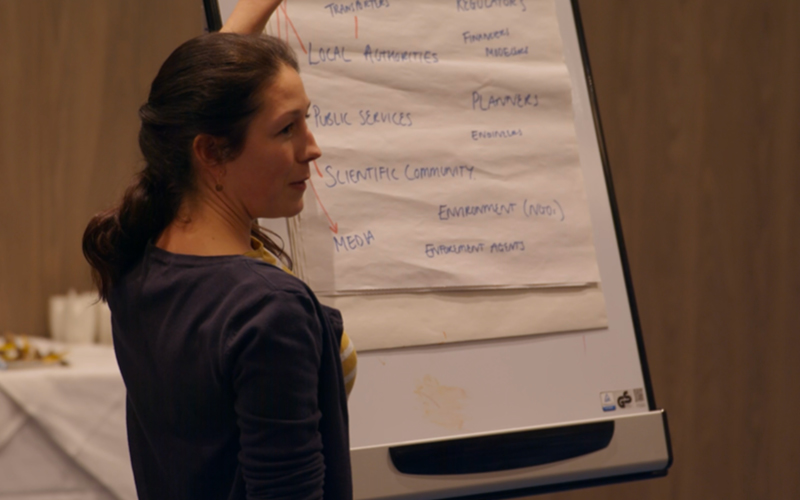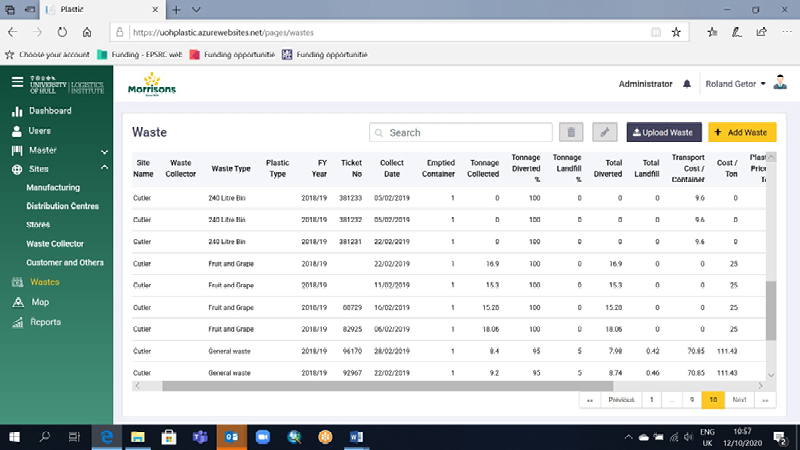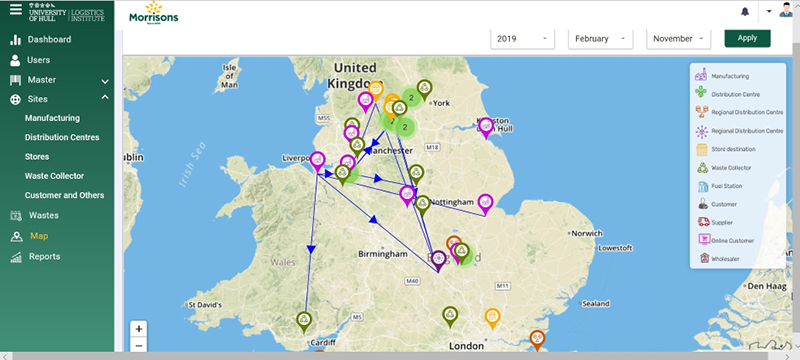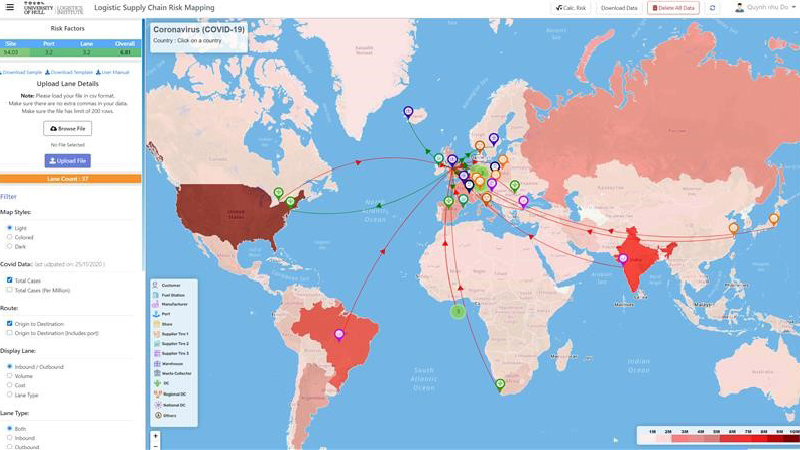The Evolving a Circular Plastics Economy project engaged with key stakeholders in the region and beyond and brought them together to participate in meaningful, structured discussion on how we can collectively support the circular plastics economy. By bringing individuals and businesses who operate within the supply chain together with academics, researchers and governmental bodies, we facilitated the exchange of knowledge from a broad range of perspectives, to help us better understand behaviours and identify the key challenges.
Our researchers hosted workshops and met with individual stakeholders and businesses on a one-to-one basis to gain a greater depth of understanding and to build meaningful relationships that will play a vital role in this work as we look to the future.
The project also utilised staff and students at the University as a test-bed for public attitudes to new plastics and considers the potential social and environmental impacts of the materials. As an informed group engaging with our experimental initiatives, this represents an influential network for onward translation and dissemination of successful initiatives to the next natural stage.
Evolving a Circular Plastics Economy is a project of the University’s Plastics Collaboratory.
Projects
From the outset, we carefully designed the transdisciplinary stakeholder engagement programme to underpin the ECPE Project as a whole. As such, the team took a dynamic approach to building a compelling picture of the challenges and opportunities around the
circular plastics economy.
The ECPE Project engaged with around 25 key stakeholders in the region and beyond and brought them together to participate in an initial workshop to facilitate meaningful, structured discussion on how we can work together to support the circular plastics economy. By bringing together individuals and businesses who operate within the supply chain with academics, researchers and governmental bodies, we were able to facilitate the exchange of knowledge and insight, from a broad range of perspectives, to help us better understand behaviours and identify the key challenges.
As well as workshops, our researchers met with individual stakeholders and businesses on a one-to-one basis to gain a greater depth of understanding and to build meaningful relationships that will play a vital role in this work as we look to the future. The findings of this work have been collated and will inform the development of best practice guidance on how to perform as a transdisciplinary team – an important piece of work that will underpin our collective approach to upcoming projects involving multiple partners and stakeholders.

“From our experience, many businesses throughout the supply chain are keen to improve the sustainability of their plastics use. They need support that is tailored to them that will facilitate this. That was a key learning for us.”
Professor Pauline Deutz, Researcher
Across the board, stakeholders were fully engaged and keen to participate in the study and to play their part in looking for solutions to the ‘plastics problem’. We found, though, that there were some fundamental differences in perspectives on what the key challenges are, and that there were contradictory views of consumers as driving or resisting change.
The need for trusted, viable solutions regarding biodegradable plastics was identified especially in the food industry and by suppliers of (highly regulated) medical products, who feel that they do not yet have sufficient information. It became clear, through the stakeholder engagement process, that these are highly complex issues that will require a delicate balance when considering what the best options will be to manage the challenges in identifying viable solutions. Based on empirical findings from focus groups at workshops it became clear that some stakeholders do not yet know enough about novel biodegradable plastics and need more information about their development.
For most stakeholders, clarity and certainty are of a paramount importance when it comes to government measures/policies on biodegradable and non-biodegradable (e.g., single use) plastics in terms of medium to long term planning. These considerations were deemed more important than the type of policy instrument (e.g., regulation, tax, fiscal incentives and voluntary agreements) adopted by central/local government. Empirical findings from workshops also showed that most stakeholders preferred financial incentives for the implementation of new technologies and operational procedures rather than the burden of regulation that can be costly and challenging to implement.

“Early in the process, businesses reported that consumers are more aware about these issues than they ever had been.”
Dr Anne Kildunne, Researcher
Case Studies
Scarborough Borough Council is committed to eliminating the use of single use plastics in the borough. To support them in this aim, this collaborative project sought to foster a greater understanding of consumer behaviours to develop a solution for the single use plastic sacks currently used.
Scarborough has a distinct infrastructure and architectural identity, with many multi-storey dwellings that present challenges for recycling, such as a lack of wheel bin and storage space. To examine and tackle these challenges, we engaged with households through the use of a survey and worked in partnership with the waste collection teams who operate in the project area, whose insight proved invaluable in the development of potential solutions.
The project team developed several different potential waste receptacle options, which were reviewed by the waste crews. The crews were fully engaged in the process, through which they highlighted practical challenges that had not been previously been considered and supported the team in developing plans for the roll out of a trial with households.
One of the key outcomes of this project was the submission of a report, with a recommendation to roll out a trial with woven sacks. The recommendations made were based on a five-year period and took account of the volume of household waste that would need to be managed. The next phase of this project would see the recommended solutions trialled with selected households, with a view to refinement and eventual roll out.
Highlights and outcomes
- Life cycle analysis on each of the proposed potential solutions
- Cost/benefit analysis of each of the proposed potential solutions
- 6-month project engaging with partners and stakeholders
- Background research on the activities of local authorities throughout the UK
- Final report featuring the recommendation to use woven polypropylene sacks
“Something that is particular to coastal towns such as Scarborough is the gulls; Any solution proposed need to be gull proof. This was another key consideration.“
“There was an enthusiasm and appetite across the board to find the right answer.“
“Not all plastics are bad. Sometimes they are the best for the job. We just need to be responsible and have the right labelling and infrastructures in place.”
Claire Lea, Researcher
It takes about 400 years for a polyethylene bag to degrade in a landfill site. The persistence of plastic waste in the environment, and the reliance of fossil fuel derived polymers for their creation, are unsustainable. The ECPE project worked with a number of stakeholder groups, including retailers, who are seeking out new, viable ways to reduce their use of plastics.
From our initial stakeholder workshop and through our ongoing dialogue thereafter, Morrisons showed a keen interest in playing their part in supporting a circular plastics economy. These initial conversations laid the foundations for an ambitious project to provide Morrisons with a standardised web enabled application (Decision Support System [DSS]), capable of tracking plastic usage, managing waste collection, recycling and disposal.
To deliver on these objectives, The University of Hull’s Logistics Institute, in collaboration with Morrisons, has successfully developed a cloud-based Decision Support System (DSS) for effective mapping of their supply chain.
The DSS allows you to:
- Simplify the complex supply chain through the visualisation and flow of plastics between business units
- Assist management by addressing fragmented data capture and storage issues within the business by using a central database
- Speed up the data collation, summary and analysis process to support the business in their work towards meeting WRAP 2025 Plastic Pact obligations
- Assist the management team in generating reports, monitoring the progress of target versus actual cost reduction, and highlight best performing sites directly from dashboard.
- Equip the team with inbuilt report and map features that assist with illustrating forward and backward linkages, the flow of plastics recycled, revenue generated from sales and costs incurred in disposal of waste.
The DSS brings together the different datasets that are required to streamline systems and standardises them, providing an easy way to input information and aggregate it. This invaluable assistance in mapping data could have a profound, positive impact for retailers struggling with the operational challenges of delivering on their environmental aspirations and commitments, offering a solution that is capable of tracking their whole supply chain.




“This tool can be configured in the future to manage plastics for any retailer.”
Professor Amar Ramudhin, Researcher
“It was challenging to get the level of detailed data we needed against the backdrop of Covid, working with multiple sites, but we got there in the end!”
Dr Roland Y Getor, Researcher
“Sometimes the message to consumers is a complicated. We need to keep it simple to facilitate change.”
Professor Nishikant Mishra, Researcher
“I see the DSS allowing us to capture data for not only plastic waste, but also other waste types like food waste. In addition, the report and visualisation functions will enable us to easily extract, export and circulate the type of information (such as month on month changes; total disposal, transport and site costs and plastic revenue) needed for management briefings and decision making.”
David Archer, Procurement Manager

